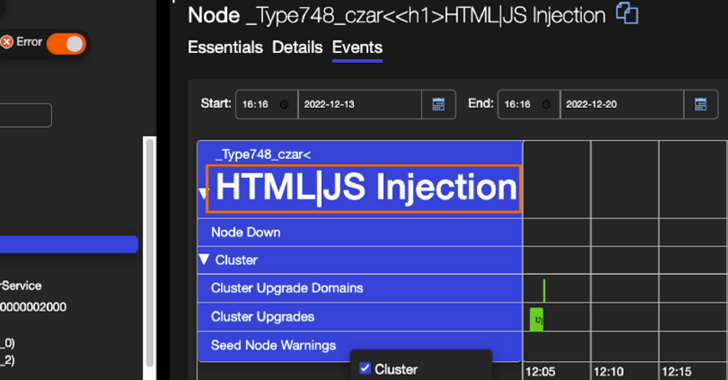Details have emerged about a now-patched vulnerability in Azure Service Fabric Explorer (SFX) that could lead to unauthenticated remote code execution.
Tracked as CVE-2023-23383 (CVSS score: 8.2), the issue has been dubbed "Super FabriXss" by Orca Security, a nod to the FabriXss flaw (CVE-2022-35829, CVSS score: 6.2) that was fixed by Microsoft in October 2022.
"The Super FabriXss vulnerability enables remote attackers to leverage an XSS vulnerability to achieve remote code execution on a container hosted on a Service Fabric node without the need for authentication," security researcher Lidor Ben Shitrit said in a report shared with The Hacker News.
XSS refers to a kind of client-side code injection attack that makes it possible to upload malicious scripts into otherwise trusted websites. The scripts then get executed every time a victim visits the compromised website, thereby leading to unintended consequences.
While both FabriXss and Super FabriXss are XSS flaws, Super FabriXss has more severe implications in that it could be weaponized to execute code and potentially gain control of susceptible systems.
Super FabriXss, which resides in the "Events" tab associated with each node in the cluster from the user interface, is also a reflected XSS flaw, meaning the script is embedded into a link, and is only triggered when the link is clicked.
"This attack takes advantage of the Cluster Type Toggle options under the Events Tab in the Service Fabric platform that allows an attacker to overwrite an existing Compose deployment by triggering an upgrade with a specially crafted URL from XSS Vulnerability," Ben Shitrit explained.
"By taking control of a legitimate application in this way, the attacker can then use it as a platform to launch further attacks or gain access to sensitive data or resources."
The flaw, according to Orca, impacts Azure Service Fabric Explorer version 9.1.1436.9590 or earlier. It has since been addressed by Microsoft as part of its March 2023 Patch Tuesday update, with the tech giant describing it as a spoofing vulnerability.
"The vulnerability is in the web client, but the malicious scripts executed in the victim's browser translate into actions executed in the (remote) cluster," Microsoft noted in its advisory. "A victim user would have to click the stored XSS payload injected by the attacker to be compromised."
The disclosure comes as NetSPI revealed a privilege escalation flaw in Azure Function Apps, enabling users with "read only" permissions to access sensitive information and gain command execution.
It also follows the discovery of a misconfiguration in Azure Active Directory that exposed a number of applications to unauthorized access, including a content management system (CMS) that powers Bing.com.
Cloud security firm Wiz, which codenamed the attack BingBang, said it could be weaponized to alter search results in Bing, and worse, even perform XSS attacks on its users.






















